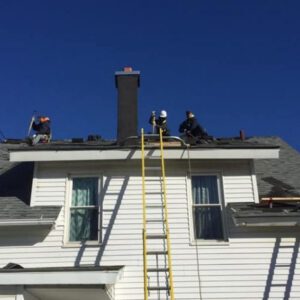Roofing contractors are not required to be licensed and do not have to carry liability insurance or workers’ compensation insurance. They estimate the cost of each job. Building maintenance staff may not know what to look for or may have other duties. They may not have the time to climb onto the roof to check for problems. The best way to detect a problem with a roof is to call Roofing Contractors Wisconsin.

If you are thinking about hiring a roofing contractor, you may wonder if they need special licensing to work in your area. While most states do not require special licensing for roofing contractors, some do require them to register with the state. This board regulates all construction activities in the state, including roofing. It requires roofing contractors to obtain licenses from the state before bidding on projects. You must also register with the state’s Division of Revenue and be covered by workers’ compensation insurance.
Roofing contractors are required to be licensed by the state’s Board of Building Regulations and Standards, and if you are doing any roofing work on a structure with asbestos, you need a Construction Supervisor License. While there is no exam for the Construction Supervisor License, you should have at least three years of experience to qualify for this license.
Roofing contractors must register with the Division of Revenue and may need Asbestos Abatement Certification. Additionally, you may be required to attend additional education through the Roofing Contractors Association. It requires contractors to obtain a contractor license through the Department of Business and Professional Regulation. Roofing contractors must obtain a contractor’s license from the State Construction Industry Licensing Board.
Some states do not require roofing contractors to have a special license. But in most cases, you’ll find that the consequences of failing to obtain a license are far worse than the cost of a permit. Using an unlicensed contractor may put your property at risk and lead to fines and even termination of your project. In some cases, an unlicensed contractor may even face jail time. But even in these situations, you may be left with no recourse.
While you don’t need special licensing for roofing, you should check with your local licensing authorities. Some states require roofers to have worker’s compensation insurance. You might also wish to consider joining a contractor association.
When it comes to insurance for your roofing company, you may be wondering if you need liability or workers’ compensation insurance for your roofing company. These types of policies protect your business from high medical costs caused by work-related accidents. In a typical scenario, workers’ compensation covers the cost of medical treatment for employees injured in the course of business operations. For example, if a roofing worker accidentally nails his hand, this policy will cover the costs of a trip to the hospital and an X-ray.
The benefits of this type of insurance are clear: you can choose to accept these benefits immediately. However, if you decide to opt for workers’ compensation benefits, you’ll forfeit your right to pursue a lawsuit or collect punitive damages. It may be a good idea to have workers’ compensation insurance to protect your assets, employees, and clients.
In most states, workers’ compensation insurance is required for construction businesses. This policy is not required for roofing contractors, but other contractors are allowed to pay into a statewide program that offers this coverage. You should contact your state’s department of insurance to determine what types of policies are available and how to obtain them.
Another factor that affects a roofing contractor’s pricing is the number of employees needed to complete the project. A roofing contractor’s overhead cost includes office rent, uniforms, and insurance. In addition, contractors must account for additional expenses such as underlayment and labor. These costs can also be increased by complicated roof shapes or multiple layers of shingles. Also, weather conditions can affect the cost of labor. If the weather is bad, the team may need to tarp the roof and pay overtime to make up for a lost time.